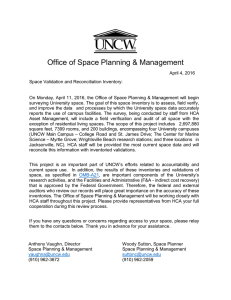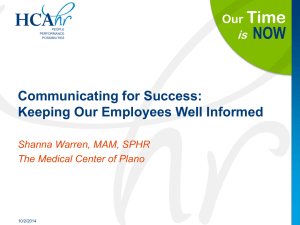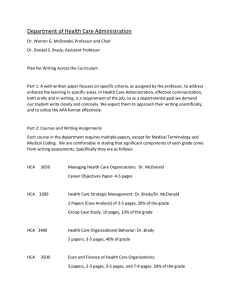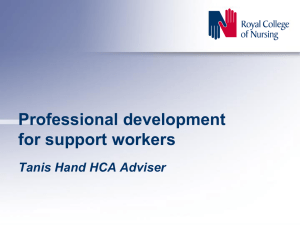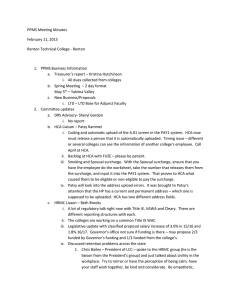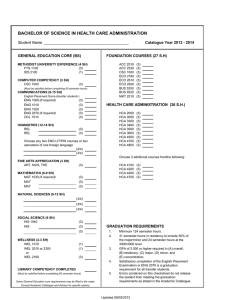The House Community Advisor (HCA) is a member of the... Office of Residence Life and reports to the Area Coordinator... HOUSE COMMUNITY ADVISOR
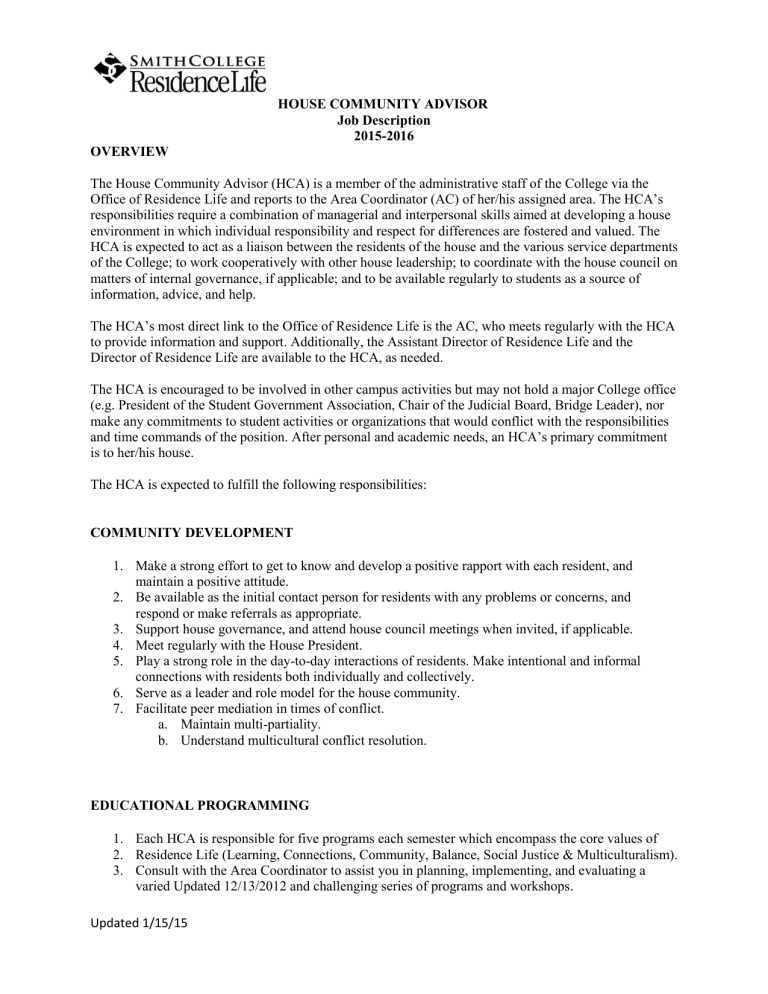
HOUSE COMMUNITY ADVISOR
Job Description
2015-2016
OVERVIEW
The House Community Advisor (HCA) is a member of the administrative staff of the College via the
Office of Residence Life and reports to the Area Coordinator (AC) of her/his assigned area. The HCA’s responsibilities require a combination of managerial and interpersonal skills aimed at developing a house environment in which individual responsibility and respect for differences are fostered and valued. The
HCA is expected to act as a liaison between the residents of the house and the various service departments of the College; to work cooperatively with other house leadership; to coordinate with the house council on matters of internal governance, if applicable; and to be available regularly to students as a source of information, advice, and help.
The HCA’s most direct link to the Office of Residence Life is the AC, who meets regularly with the HCA to provide information and support. Additionally, the Assistant Director of Residence Life and the
Director of Residence Life are available to the HCA, as needed.
The HCA is encouraged to be involved in other campus activities but may not hold a major College office
(e.g. President of the Student Government Association, Chair of the Judicial Board, Bridge Leader), nor make any commitments to student activities or organizations that would conflict with the responsibilities and time commands of the position. After personal and academic needs, an HCA’s primary commitment is to her/his house.
The HCA is expected to fulfill the following responsibilities:
COMMUNITY DEVELOPMENT
1.
Make a strong effort to get to know and develop a positive rapport with each resident, and maintain a positive attitude.
2.
Be available as the initial contact person for residents with any problems or concerns, and respond or make referrals as appropriate.
3.
Support house governance, and attend house council meetings when invited, if applicable.
4.
Meet regularly with the House President.
5.
Play a strong role in the day-to-day interactions of residents. Make intentional and informal connections with residents both individually and collectively.
6.
Serve as a leader and role model for the house community.
7.
Facilitate peer mediation in times of conflict. a.
Maintain multi-partiality. b.
Understand multicultural conflict resolution.
EDUCATIONAL PROGRAMMING
1.
Each HCA is responsible for five programs each semester which encompass the core values of
2.
Residence Life (Learning, Connections, Community, Balance, Social Justice & Multiculturalism).
3.
Consult with the Area Coordinator to assist you in planning, implementing, and evaluating a varied Updated 12/13/2012 and challenging series of programs and workshops.
Updated 1/15/15
4.
During the month of September, three Connection programs should be completed with the four remaining core value programs being spread over the remaining months of the semester.
5.
Disseminate information on campus-wide events and promote involvement in diversity programs and other educational opportunities at the college and within the Five College area.
6.
Support and attend study breaks, diversity/social justice programs, house events coordinated by the HCA and house council.
7.
Collaborate with other house leaders to develop programming. Consider house needs when planning programming.
8.
Promote and support the House Fellow and Alumnae-in-Residence programs.
TRAINING, SUPERVISION, AND EDUCATION
1.
Attend several orientation/training meetings in the prior spring semester. After being appointed, attend residence life training in August residence life training in August (a two-week orientation/training program before school starts) and in-service training throughout the year, in addition to the training period during the January interterm. As training is mandatory, please be aware of scheduled training dates during August and January, made available to you in a timely manner. In the event that a Head Resident needs to be excused from a training session, it is required to provide a written request to the Area Coordinator well in advance for approval. You will be held accountable for time and information missed.
2.
Attend regular meetings and workshops as called by the Area Coordinators or the Director of
Residence Life. This would include a two-hour weekly area meeting on Tuesday evenings.
3.
Meet for supervisory/one-on-one meetings with the Area Coordinator.
4.
Participate in a formal Head Resident feedback process.
5.
Attend required professional development sessions throughout the year. Committee work be substituted as professional development as determined by area coordinator
6.
Submit weekly reports each Monday by 1:00 PM to your Area Coordinator. Community Report
Forms and other administrative paperwork should be turned in, in a timely manner.
Updated 1/15/15
HOUSE RESPONSIBILITIES
1.
Accessibility a.
Be accessible in the house often, especially during evening hours, Friday house teas, and attend meals in the house regularly (Minimum standards are one meal per day, approximately seven per week.). b.
Be available for 3 suite hours per week when you are accessible to house members. These suite hours should be set to fit into the House Community Advisors schedule and after discussion with the house about the most effective times. These hours should be posted to the house with one hour each week being a “floating hour” when you walk around the house to see residents and note facilities concerns. c.
Learn the procedure for emergencies established by the College, communicate and disseminate these procedures to all members of the house.
2.
Nights a.
Nights away should be taken in reason and with the permission of the Area Coordinator.
For each night away you must arrange for another HR/HCA/HC to be a contact person for that evening. Leave contact and emergency information for residents. b.
Extended time away (2 or more nights) should be discussed in advance with your Area
Coordinator. c.
Be in residence, working with the house (see social system expectations) on the nights the house has a party scheduled. This includes Parents Weekend, Winter Weekend,
Spring Weekend and Senior Banquet events. It is expected that these dates are negotiated with the House Community Advisor
3.
Maintain Community Standards a.
Know, understand and follow house and college policies and help other students understand their rights and responsibilities as members of the community. b.
Ensuring that as a student staff member, you uphold the policies of the house, college and hold others accountable for doing the same. c.
Address violations of college policy.
4.
House Administration a.
Communicate regularly with the Head Resident and House President and work with the
House Council on matters of internal governance. This may involve attending additional meetings. It is expected that these dates and times will be discussed in advance. b.
Meet weekly with the House President and Head Resident to discuss house issues and concerns c.
Serve as a communication link between students and the administration by posting and announcing information. d.
Assist the Housing Coordinator by keeping accurate records of the students residing in the house, assisting with the room draw process, and other assigned tasks. e.
Support Building Services in an effort to keep accurate room condition reports (RCRs), including checks in and out when people move in and out of rooms. f.
Complete room checks for Room Condition Reports (RCRs), for Fire, Health and Safety inspections and for special circumstance as directed by the Area Coordinator and
Housing Coordinator that are within the policies and procedures of the Smith College
Handbook. g.
Head Residents will receive a programming allowance as determined by that year’s budget to help fund house activities. Head Residents are held accountable to their respective Area Coordinators for submitting all receipts throughout the semester.
Updated 1/15/15
h.
Be in-house for Winter, Spring and Family Weekends, Senior Banquet and all other major house social events and parties. i.
Work with the house HR to identify, publicize and staff 5 hours in which the trunk rooms will be open for students to store their belongings during the last week of classes and finals.
VACATIONS
1.
Be in residence through the end of each semester (ie until houses close) to assist with closing of the houses.
2.
Communicate early with your supervisor about when you are planning on leaving for nonsemester ending breaks.
3.
Staff that are on campus for the full duration of January term and have no other significant commitments during this time will be financially compensated for staffing houses. Houses will be staffed on a “first come, first serve” basis as there is limited funding for compensation.
COLLABORATION
1.
Connect regularly with and serve as a liaison to, Building Services and Dining Services supervisors, custodial, and housekeeping staff.
2.
Manage written requests and call in any emergencies for Facilities Management assistance.
3.
Cooperate with Campus POlice by investigating and resolving noise and other complaints.
4.
Cooperate, communicate and act as liaison with all departments, offices and individuals at Smith as outlined in this job description, including, Dean of Students, Class Deans, Chapel Staff,
International students and scholars
5.
Students and Study Abroad, Multicultural Affairs, to name a few.
6.
Assist in the room selection process (Room Draw) and staff selection (both Fall and Spring semesters), with the amount of hours needed to work determined by the professional staff
7.
Publicize and attend programs sponsored by the Office of Residence Life.
8.
Participate in committee work as deemed necessary by the Office of Residence Life.
9.
Participate in Otelia Cromwell Day Events.
10.
And other duties as assigned by the College.
MISCELANEOUS
1.
Other tasks as assigned by supervisor.
COMPENSATION
The House Community Advisor (HCA) receives the full work-study amount allowable for the year
(which was $3198 for 2014-2015). This is disbursed via bi-weekly checks and is considered taxable wages. If the staff member agrees to work during January term they will be compensated an additional
$230 (approx.) for the year. The HCA’s compensation will be prorated if her/his start or end date differs from the standard contract dates.
Updated 1/15/15
The HCA may not hold a second campus job, regardless of whether or not she/he receives financial aid.
The HCA may supplement her/his earnings with spot jobs and off-campus positions, after discussion with the AC.
The HCA must file I-9 and W-4 forms with the Student Payroll Office prior to employment. The HCA’s paychecks will not be issued if these forms are not completed.
CONTINUATION
The HCA must sign the Contract for Employment for Residence Life Student Staff Members.
The HCA must be a full-time matriculated student at Smith College throughout the period of employment and must maintain a 2.5 cumulative GPA.
The HCA will be terminated at any time as a result of:
1. Violating the College’s Alcohol Policy
2. Harming or threatening to harm another person
The HCA’s employment may be terminated at any time as a result of the following conditions:
1. Violation of College policy;
2. Academic probation;
3. Failure to comply with the conditions of a warning or probation, as issued by the AC;
4. Unsatisfactory job evaluation;
5. Withdrawal from the College.
Resignation should be discussed with the AC. In the event of resignation or termination, the HCA will vacate her/his assigned room/suite and return all keys to the AC or the Housing Coordinator within 72 hours. Staff members who leave their position mid-year may not continue to live in the same house in which they were a staff member. The Housing Coordinator will reassign the former HCA to a new room.
Continuation of the appointment, and the remuneration and benefits, is dependent upon satisfactory job performance and student status with the college.
Important Note
These stipends may affect the HCA’s financial aid allotment. Because financial aid packages differ from student to student, any student interested in the HCA position should contact the Financial Aid Office for information about how the financial aid package may be affected. No student whether on aid or not may hold more than one “permanent” job on campus. This means that you cannot hold a second campus job; however, you may supplement your primary earnings with spot job earnings. The limitation of one primary job per student is to insure equity and opportunity among all students at Smith and has no bearing on whether you are on financial aid or not.
Updated 1/15/15

